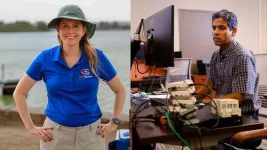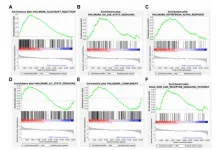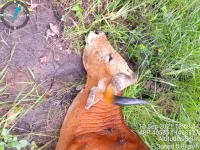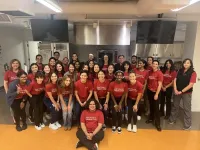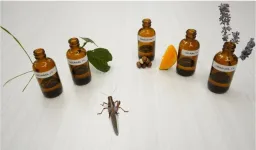(Press-News.org) Research led by the Peter Doherty Institute for Infection and Immunity (Doherty Institute) and the Kirby Institute found that inflammation in the body can slow down the development of malaria parasites in the bloodstream – a discovery that may constitute a potential new strategy for preventing or limiting severe disease.
A mosquito-borne disease, malaria is caused by Plasmodium parasites, which invade and multiply within red blood cells. Previous research has shown that the parasites can rapidly sense and respond to conditions within the host by intimately syncing with their internal body clocks. While it is known that the body’s nutrient levels and daily circadian rhythms affect the parasites’ development, little was known about the impact of host inflammation on the parasites – until now.
This animal-model study, published in the journal mBio, reveals that when the body's immune system responds to inflammation it alters the chemical make-up of the plasma, which directly hinders the maturation of the Plasmodium parasites as they circulate in the bloodstream.
University of Melbourne’s Associate Professor Ashraful Haque, Laboratory Head and co-lead of the Bacterial and Parasitic Infections theme at the Doherty Institute, and one of the senior authors of the paper, said this work highlights the captivating dynamic of the host-parasite relationship.
“First, we discovered that inflammation in the body prevented the early stage of the parasites from maturing. We also noticed that inflammation triggered significant changes in the composition of the plasma – we were actually quite surprised by the magnitude of these changes,” said Associate Professor Haque.
“As we dug deeper, we found substances in the altered plasma that, we believe, are what may inhibit parasite growth in the body. This work reveals a new mechanism that slows down the malaria parasite’s development in the bloodstream. Our research was done using animal models, so it would be really interesting to study if such inhibitory mechanisms occur in humans too.”
Dr David Khoury, Lead of the Malaria Analytics Group at the Kirby Institute and co-senior author of the paper, said the scientists found a remarkable response by the parasites to the changes in their environment.
“Parasites residing in red blood cells rapidly sense and respond to their new environment, showing fascinating adaptability. Using cutting-edge genome sequencing technology, we observed that even after just four hours in this changed plasma, the parasites adjusted their genetic and protein activity, resulting in slower maturation within red blood cells. It’s almost like the parasites actively sense an inhospitable host environment, and as a result trigger a coping mechanism,” said Dr Khoury.
“We believe this is the first study to show that inflammation can change how individual parasites behave genetically in the body.”
Professor Miles Davenport, Program Head of the Infection Analytics Program at the Kirby Institute and co-senior author of the paper, said this work on the interaction between systemic host inflammation and malaria parasite maturation offers several potential benefits.
“This study, while based on animal models, broadens our understanding of malaria. It provides a foundation for further investigations into the specific mechanisms involved in the modulation of parasite maturation by inflammation, and opens avenues for future studies to explore the identified inhibitory factors, genetic changes and their implications for malaria development,” said Professor Davenport.
“Ultimately, our work aims to, one day, inform the development of potential new strategies to control, prevent and reduce the burden of malaria which affects over 240 million people globally.”
This research was conducted in collaboration with researchers from the Doherty Institute, The Kirby Institute, QIMR Berghofer Medical Research Institute, Wellcome Sanger Institute (UK) and Monash Institute of Pharmaceutical Sciences.
- ENDS
Additional information:
This research was funded by the Australian Research Council (ARC).
This research paper was published in the journal mBio (DOI: 10.1128/mbio.01129-23)
END
Inflammation slows malaria parasite growth and reproduction in the body
Research led by the Peter Doherty Institute for Infection and Immunity (Doherty Institute) and the Kirby Institute found that inflammation in the body can slow down the development of malaria parasites in the bloodstream.
2023-08-08
ELSE PRESS RELEASES FROM THIS DATE:
Mothers experiencing depression can still thrive as parents
2023-08-08
The proverb “It takes a village to raise a child” takes on new significance when a mother of a child is experiencing depression.
“Being a mother with depression carries increased risks for a child’s physical and psychological health,” says Dr. Sarah Dow-Fleisner, Assistant Professor in the School of Social Work and Director of the Centre for the Study of Services to Children and Families at UBC Okanagan. “But it’s not fated to be, especially if mothers have external supports.”
Dr. Dow-Fleisner’s findings, recently published in the ...
Prestigious NSF grants awarded to UTEP early-career faculty
2023-08-08
EL PASO, Texas (Aug. 8, 2023) – Two University of Texas at El Paso researchers have earned one of the nation’s highest awards for early-career faculty in 2023.
Laura Alvarez, Ph.D., an assistant professor in the Department of Earth, Environmental and Resource Sciences, received a $550,000 grant from the National Science Foundation’s (NSF) Faculty Early Career Development (CAREER) Program. The funds will support her research in understanding how river landscapes and their ecological and economic values such as hydroelectric ...
AIBS receives NSF Award to convene discussions on building an integrated, open, FAIR data network
2023-08-08
The American Institute of Biological Sciences (AIBS) has been awarded a workshop grant (Award No. 2303588) from the National Science Foundation (NSF) to support the development of a series of discussions on enabling interdisciplinary and collaborative science through the integration of biological and environmental data. AIBS, in collaboration with the Biodiversity Collections Network (BCoN), will organize a set of domain-focused virtual listening sessions and a subsequent interdisciplinary workshop to engage an expansive set of stakeholders toward Building an Integrated, Open, Findable, Accessible, Interoperable, and Reusable (BIOFAIR) Data Network.
During the last two decades, a wealth ...
UTHealth Houston researcher awarded $3.1M NIH grant to study sudden unexpected death in epilepsy
2023-08-08
A five-year, $3.1 million grant to study preventive strategies for sudden unexpected death in epilepsy (SUDEP) has been awarded to UTHealth Houston by the National Institutes of Health (NIH) National Institute of Neurological Disorders and Stroke.
Nuria Lacuey Lecumberri, MD, PhD, associate professor in the Department of Neurology with McGovern Medical School at UTHealth Houston, is principal investigator of the study, which builds upon her years of research analyzing breathing during epileptic seizures and the localization of brain areas involved in breathing regulation.
SUDEP is a devastating ...
Sustainable Cocoa Innovation Challenge for Colombia: Supporting innovation in the cocoa value chain to foster climate change mitigation and peacebuilding
2023-08-08
Bogotá, 04 August 2023. The Sustainable Cocoa Innovation Challenge for Colombia has been launched as the result of the joint effort between CGIAR research initiatives AgriLAC Resiliente and Mitigate+ and the project “Implementing Sustainable Agricultural and Livestock Systems for Simultaneous Targeting of Forest Conservation for Climate Change Mitigation (REDD+) and Peacebuilding in Colombia,” otherwise known as the IKI-SLUS Project.
The CGIAR Accelerate for Impact ...
Inhibiting NLRP3 signaling in aging podocytes improves longevity
2023-08-08
“Together, these results suggest a critical role for the NLRP3 inflammasome in podocyte and liver aging.”
BUFFALO, NY- August 8, 2023 – A new research paper was published in Aging (listed by MEDLINE/PubMed as "Aging (Albany NY)" and "Aging-US" by Web of Science) Volume 15, Issue 14, entitled, “Inhibiting NLRP3 signaling in aging podocytes improves their life- and health-span.”
The decrease in the podocyte’s lifespan and health-span that typify healthy kidney aging cause a decrease in their normal structure, physiology and function. The ability to halt and even reverse these changes becomes clinically relevant ...
New technique measures structured light in a single shot
2023-08-08
Structured light waves with spiral phase fronts carry orbital angular momentum (OAM), attributed to the rotational motion of photons. Recently, scientists have been using light waves with OAM, and these special "helical" light beams have become very important in various advanced technologies like communication, imaging, and quantum information processing. In these technologies, it's crucial to know the exact structure of these special light beams. However, this has proven to be quite tricky.
Interferometry ...
Study: Vaccination campaign in Cambodia protects endangered wild cattle from highly contagious potentially fatal skin disease
2023-08-08
Scientists from the Wildlife Conservation Society (WCS), the Ministry of Environment, and the Ministry of Agriculture Forestry and Fisheries of the Royal Government of Cambodia have documented the first case of lumpy skin disease (LSD) in wildlife in Cambodia.
The case involved a banteng (Bos javanicus), an endangered wild cattle species, that was discovered by community patrol members from Our Future Organization while on patrol in Phnom Tnout – Phnom Pork Wildlife Sanctuary in September 2021.
It is suspected that the banteng contracted ...
Pipeline program at Keck School of Medicine boosts primary care residency matches and representation
2023-08-08
Primary care provides critical support for the global health care system. But in many communities across the country and around the world, primary care physicians are in short supply.
To help bridge that gap and inspire more students to choose careers in primary care, the Keck School of Medicine of USC launched its Primary Care Initiative in 2011. A key part of the initiative, the Primary Care Program (PCP), is an educational track that provides medical students with a range of patient-centered, hands-on experiences in the local community to prepare them for a career ...
Good smells, bad smells: It’s all in the insect brain
2023-08-08
Everyone has scents that naturally appeal to them, such as vanilla or coffee, and scents that don’t appeal. What makes some smells appealing and others not?
Barani Raman, a professor of biomedical engineering at the McKelvey School of Engineering at Washington University in St. Louis, and Rishabh Chandak, who earned bachelor’s, master’s and doctoral degrees in biomedical engineering in 2016, 2021 and 2022, respectively, studied the behavior of the locusts and how the neurons in their brains responded to appealing and unappealing odors to learn more about how the brain encodes ...
LAST 30 PRESS RELEASES:
Black soldier fly larvae show promise for safe organic waste removal
People with COPD commonly misuse medications
How periodontitis-linked bacteria accelerate osteoporosis-like bone loss through the gut
Understanding how cells take up and use isolated ‘powerhouses’ to restore energy function
Ten-point plan to deliver climate education unveiled by experts
Team led by UC San Diego researchers selected for prestigious global cancer prize
Study: Reported crop yield gains from breeding may be overstated
Stem cells from human baby teeth show promise for treating cerebral palsy
Chimps’ love for crystals could help us understand our own ancestors’ fascination with these stones
Vaginal estrogen therapy not linked to cancer recurrence in survivors of endometrial cancer
How estrogen helps protect women from high blood pressure
Breaking the efficiency barrier: Researchers propose multi-stage solar system to harness the full spectrum
A new name, a new beginning: Building a green energy future together
From algorithms to atoms: How artificial intelligence is accelerating the discovery of next-generation energy materials
Loneliness linked to fear of embarrassment: teen research
New MOH–NUS Fellowship launched to strengthen everyday ethics in Singapore’s healthcare sector
Sungkyunkwan University researchers develop next-generation transparent electrode without rare metal indium
What's going on inside quantum computers?: New method simplifies process tomography
This ancient plant-eater had a twisted jaw and sideways-facing teeth
Jackdaw chicks listen to adults to learn about predators
Toxic algal bloom has taken a heavy toll on mental health
Beyond silicon: SKKU team presents Indium Selenide roadmap for ultra-low-power AI and quantum computing
Sugar comforts newborn babies during painful procedures
Pollen exposure linked to poorer exam results taken at the end of secondary school
7 hours 18 mins may be optimal sleep length for avoiding type 2 diabetes precursor
Around 6 deaths a year linked to clubbing in the UK
Children’s development set back years by Covid lockdowns, study reveals
Four decades of data give unique insight into the Sun’s inner life
Urban trees can absorb more CO₂ than cars emit during summer
Fund for Science and Technology awards $15 million to Scripps Oceanography
[Press-News.org] Inflammation slows malaria parasite growth and reproduction in the bodyResearch led by the Peter Doherty Institute for Infection and Immunity (Doherty Institute) and the Kirby Institute found that inflammation in the body can slow down the development of malaria parasites in the bloodstream.
